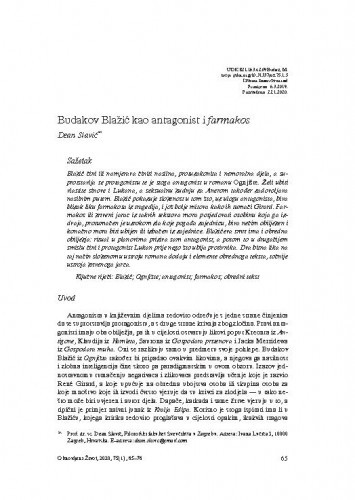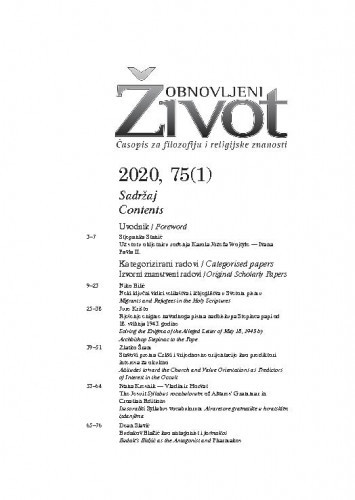Blažić čini ili namjerava činiti nasilna, protuzakonita i nemoralna djela, a suprotstavlja se protagonistu te je stoga antagonist u romanu Ognjište. Želi ubiti vlastite sinove i Lukana, a seksualnu žudnju za Anerom također zadovoljava nasilnim putem. Blažić pokazuje složenost u tom što, uz ulogu antagonista, biva blizak liku farmakosa iz tragedija, i još bolje mitova kako ih tumači Girard. Farmakos ili žrtveni jarac iz takvih tekstova mora posjedovati osobinu koja ga izdvaja, protumačen je uzrokom zla koje pogađa zajednicu, biva nečim obilježen i konačno mora biti ubijen ili izbačen iz zajednice. Blažićeva smrt ima i obredna obilježja: ritual u planovima priziva sam antagonist, a potom to u drugačijem smislu čini i protagonist Lukan prije nego što ubija protivnika. Dva bitna lika na taj način složenomu ustroju romana dodaju i elemente obrednoga teksta, točnije ustroja žrtvenoga jarca.; Blažić, a character from Budak’s novel The Hearth (Ognjište), commits or attempts to commit violent, criminal and immoral deeds. He stands in direct opposition to the protagonist Lukan and is therefore the antagonist. He tries to kill his own sons and thus satisfies his desire for Anera in a violent manner. Blažić demonstrates also the more complex nature of his being in the novel for, in addition to his role as a negative force, he possesses obvious features of the pharmakos in Greek tragedies, and even more of the same from myths as described by Girard. The pharmakos, or scapegoat, is the cause of evil in a community, therefore he must be branded and finally ostracized, perhaps murdered. The death of Blažić is depicted using ritual motifs. Vague allusions are made to sacramental rites by the antagonist and scapegoat himself before the very end of the novel, though their meaning is ultimately revealed in the protagonist’s words as he kills his opponent. The two opposite characters add elements of the ritual text to the structure of the novel.
Sažetak

 Obnovljeni život : časopis za religioznu kulturu : 75, 1(2020) / glavni urednik Tadija Milikić.
Obnovljeni život : časopis za religioznu kulturu : 75, 1(2020) / glavni urednik Tadija Milikić.